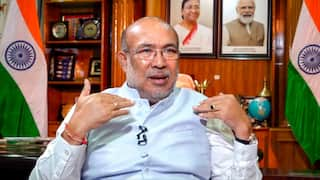Blood Cancer Awareness Month 2023: Balanced diet, Adequate Sleep- Know Lifestyle Tips To Manage Blood Cancer
While medical treatments remain crucial for cancer treatments, lifestyle changes also play a pivotal role in managing the condition and enhancing the quality of life.

Blood cancer, encompassing leukemia, lymphoma, and myeloma, is a daunting diagnosis. While medical treatments remain crucial, lifestyle changes play a pivotal role in managing the condition and enhancing the quality of life. In this article, ABP Live has sought the opinion of experts who shared some lifestyle tips so that blood cancer can be managable.
Dr Balakrishna Padate, who is the Director of Centre for Haematology & Bone Marrow Transplant, at Nanavati Max Super Speciality Hospital said, "While managing blood cancer, one must follow a lifestyle that supports their own wellbeing, ongoing treatment and medication. A proactive, informed, and collaborative approach is essential. And most importantly, choose a healthcare facility that has Disease Management Groups where multiple specialists such as hematologists, oncologists, dieticians, physiotherapists, and psychologists can provide a comprehensive approach to care."
- Balanced Diet: Adopt a diet rich in fruits, vegetables, and whole grains. These foods provide essential vitamins, minerals, and antioxidants that support your immune system and overall health. Limit red meat and processed foods to reduce inflammation.
- Hydration: Staying well-hydrated is vital. Water helps flush toxins from your body and ensures proper blood circulation. Aim for at least 8-10 glasses of water daily.
- Regular Exercise: Engage in moderate exercise, like walking, swimming, or yoga, to boost your energy levels, reduce stress, and maintain a healthy weight. Consult your healthcare team for a tailored exercise plan.
- Stress Management: Chronic stress weakens immune system. Practice stress-relief techniques such as meditation, deep breathing, or mindfulness to stay calm and reduce anxiety.
- Adequate Sleep: Prioritize quality sleep. Aim for 7-9 hours of uninterrupted rest per night. Good sleep promotes healing and reduces fatigue.
- Avoid Smoking and Alcohol: Both smoking and excessive alcohol consumption worsens blood cancer symptoms and interfere with treatments. Quit smoking and limit alcohol intake, or avoid it altogether.
- Regular Medical Check-ups: Maintain regular follow-ups with the doctor. It is essential for monitoring present condition, adjusting treatment plans if necessary, and addressing any concerns promptly.
- Support Network: Seek emotional support from friends, family, or support groups. Coping with blood cancer can be emotionally challenging, and a strong support network makes a significant difference.
- Nutritional Supplements: Discuss with the doctor if you need supplements such as iron, vitamin D, or B12. Blood cancer and its treatments may affect nutrient absorption.
- Complementary Therapies: Complementary therapies like acupuncture, massage, or aromatherapy for symptom relief and improved well-being are important.
- Infection Prevention: Blood cancer weakens immune system. Practice good hygiene, avoid crowded places during flu season, and get recommended vaccinations to prevent infections.
Lastly, Dr Sanjeev Kumar Sharma, who is the Director, Hemato-oncology and BMT, BLK-MAX Super Speciality Hospital said, "Though there are no preventive measures for the blood cancers, it is speculated that increased exposure to harmful radiations, chemicals and infection with certain oncogenic viruses can predispose to blood cancers. The treatment of blood cancer involves chemotherapies and bone marrow transplantation. With newer treatment modalities, majority of blood cancer patients can now live a prolonged life."
[Disclaimer: The information provided in the article, including treatment suggestions shared by doctors, is intended for general informational purposes only. It is not a substitute for professional medical advice, diagnosis, or treatment. Always seek the advice of your physician or other qualified healthcare provider with any questions you may have regarding a medical condition.]
Check out below Health Tools-
Calculate Your Body Mass Index ( BMI )
Top Headlines
Trending News






































